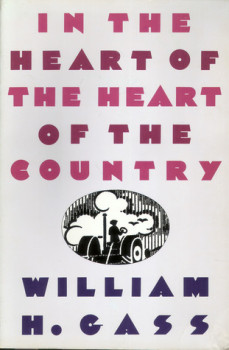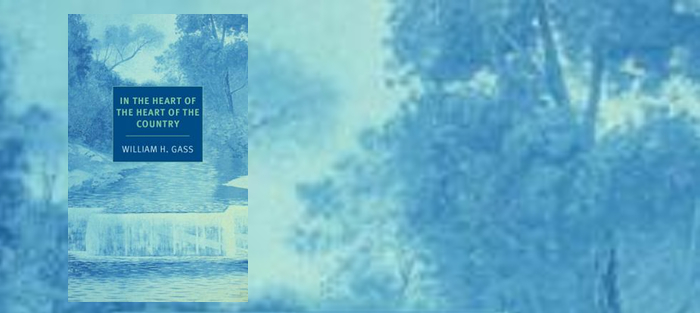Landscape, and how writers write from a particular landscape, has become a central question for me in my writing and reading practices. I’ve begun to look for the ways that authors not only include markers of place in their fiction—regionalisms of setting, environment, dialect, even character hobbies—but how the language itself grows out of the landscape. How does the lush greenery of Washington State differ from the windswept plains of Nebraska, and how do these differences work their way into the language that authors use in writing those landscapes? How does the wind sound in North Carolina, as opposed to Texas, and how does that rhythm work its way into prose?
William Gass’s “In the Heart of the Heart of the Country” stands as an answer for what it means to write from the Midwest. Told in thirty-six discrete sections, this story is a devastatingly gorgeous meditation on loss and the rhythms of the Midwestern landscape. The language itself captures the harsh beauty of the seasons as observed by a middle-aged poet contemplating his small Indiana town. In the introduction to the collection by the same name, Gass writes:
Nature rarely loops. Nature repeats. This spring is not a former spring rethought, but merely another one, somewhat the same, somewhat not. However, in a fiction, ideas, perceptions, feelings, return like reconsiderations, and the more one sees a piece of imaginative prose as an adventure of the mind, the more the linearities of life will be bent and interrupted.
So it is in “In the Heart of the Heart of the Country,” a story that evades narrative for the repetition of sections instead, blocks of prose that mirror the cycles of the Midwest’s seasons.
 Within this story, Gass captures the changing moods of Indiana’s landscape. He writes its darkness: “In the Midwest, around the lower Lakes, the sky in the winter is heavy and close, and it is a rare day, a day to remark on, when the sky lifts and allows the heart up. I am keeping count, and as I write this page, it is eleven days since I have seen the sun.” The story’s sections replicate this counting off, not unlike the pages of an almanac or the log of a field diary. And just as the seasons change, so does the way the narrator writes the land. The sky is heavy in January, but infinite in October: “The shade is ample, the grass is good, the sky a glorious fall violet; the apple trees are heavy and red, the roads are calm and empty; corn has sifted from the chains of tractored wagons to speckle the streets with gold and with the russet fragments of the cob, and a man would be a fool who wanted, blessed with this, to live anywhere else in the world.”
Within this story, Gass captures the changing moods of Indiana’s landscape. He writes its darkness: “In the Midwest, around the lower Lakes, the sky in the winter is heavy and close, and it is a rare day, a day to remark on, when the sky lifts and allows the heart up. I am keeping count, and as I write this page, it is eleven days since I have seen the sun.” The story’s sections replicate this counting off, not unlike the pages of an almanac or the log of a field diary. And just as the seasons change, so does the way the narrator writes the land. The sky is heavy in January, but infinite in October: “The shade is ample, the grass is good, the sky a glorious fall violet; the apple trees are heavy and red, the roads are calm and empty; corn has sifted from the chains of tractored wagons to speckle the streets with gold and with the russet fragments of the cob, and a man would be a fool who wanted, blessed with this, to live anywhere else in the world.”
As a native of St. Louis, where Gass has lived and written since 1969 when he first began teaching at Washington University, I’m drawn to this passage in particular for the ways I understand my own landscape of origin. The sentence carries the rhythm of the land, the repetition of seasons and cycles in my own blood. It speaks to the ways in which a landscape of origin burrows in and becomes who you are—and by extension, what you write. In the words of Gass’s narrator:
Lost in the corn rows, I remember feeling just another stalk, and thus this country takes me over in a way I occupy myself when I am well…completely – to the edge of both my house and body. No one notices, when they walk by, that I am brimming in the doorways. My house, this place and body, I’ve come in mourning to be born in.
Where we are born, where the land takes us over: these rhythms of landscape manifest in the fiction we write, an innate language. In “In the Heart of the Heart of the Country,” Gass finds the native tongue of the Midwest.






